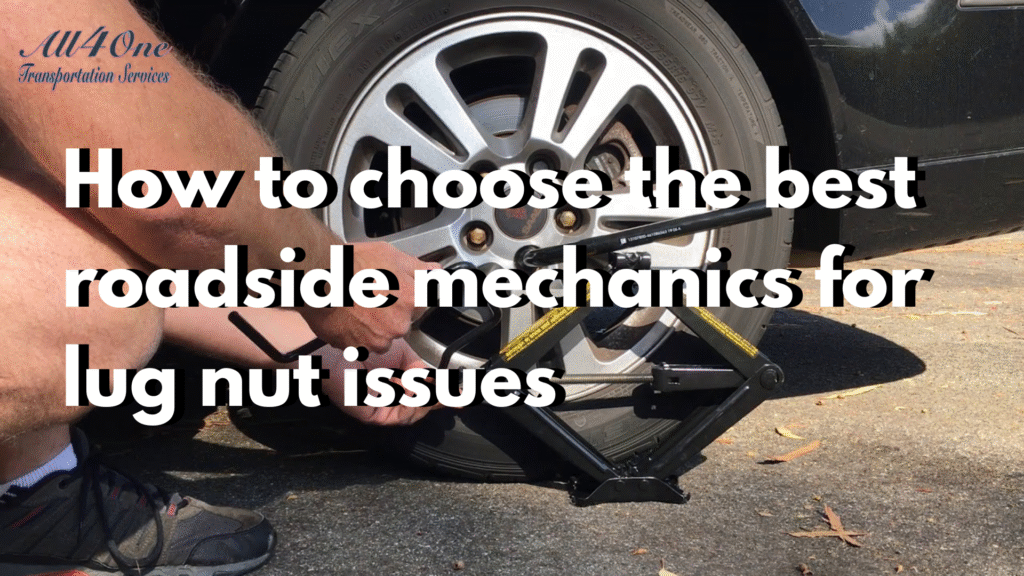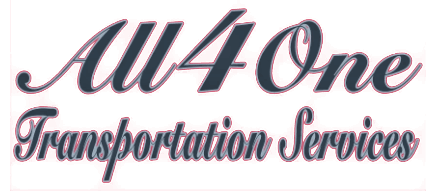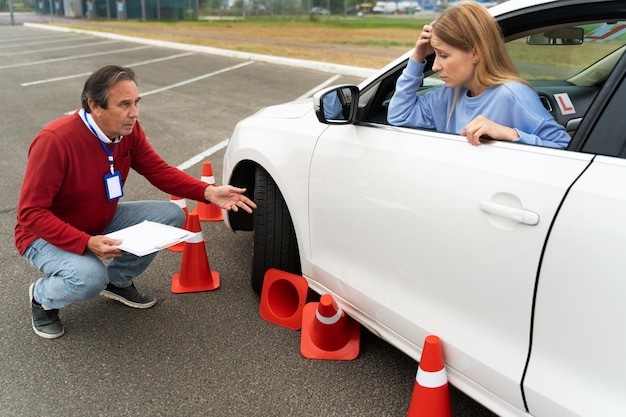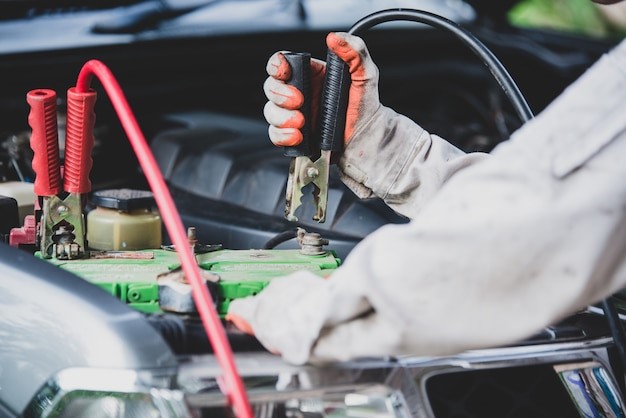A rounded, seized, or broken lug nut can derail a day in minutes and turn routine maintenance into urgent liability. In Allenhurst, the drivers who get moving again fastest are the ones who call specialists — technicians who combine extraction skill, heavy-duty tools, and attention to component preservation. All 4 One Transportation & Roadside Assistance provides local, trusted field mechanics who treat lug-nut problems as surgical issues: fast, precise, and accountable. This page explains why specialization matters, what competent roadside lug-nut service looks like, and how to pick the best roadside mechanics for lug nut issues Allenhurst drivers trust.
Why you need a specialist for lug nut problems
A lug nut issue is not merely about brute force; it’s about protecting studs, rotors, and wheel integrity while restoring mobility. Experienced roadside specialists recognize the subtle differences between corrosion, cross-threading, over-torque, and sheer failures and choose methods accordingly. Using the wrong socket or excessive impact can round a nut, shear a stud, or damage a wheel — consequences that often cost far more than the original fix. The best roadside mechanics for lug nut issues Allenhurst depend on know-how, the right extraction kits, and an insistence on preservation over speed. That combination prevents a single stuck nut from turning into a multi-hour shop visit.
Identifying the root cause fast
The first step is diagnosis: seeing whether the nut is corroded, rounded, seized, or fractured determines the extraction path. Specialists palpate threads, visually inspect the head, and test for movement before choosing heat, penetrating fluids, extractor sockets, or hydraulic splitters. Misdiagnosis leads to wasted effort and more damage; accurate assessment shortens job time and preserves parts. A quick, correct read is what separates true experts from general roadside helpers. In Allenhurst, that rapid diagnostic skill saves time and money.
The cost of guesswork
Improvised attempts with pliers, hammers, or the wrong sockets often round the hex and necessitate drilling or stud replacement later. Those backyard maneuvers convert a quick roadside fix into a longer, costlier shop repair and add downtime. Trusted mechanics avoid that path by using measured force and proper tools from the outset. The upfront cost of a trained technician is small compared with the downstream expenses of a botched extraction. Expertise is an investment in preventing larger losses.
Preservation-first philosophy
Top providers prioritize methods that preserve studs and hubs and only escalate to invasive measures when absolutely required. That could mean trying extractor sockets and small heat treatments before controlled drilling, or using a hydraulic nut splitter to save the stud. Preserving original components maintains wheel balance and reduces the risk of vibration or alignment problems after the repair. It’s a conservative approach that reflects a respect for long-term vehicle health. Drivers notice the difference—fewer follow-ups and smoother rides.
What true roadside lug nut specialists bring
A qualified roadside mechanic arrives with more than a jack and a socket set; they bring extractor sockets, hydraulic splitters, stud replacement kits, guarded drilling guides, and torque-calibrated wrenches. Those tools need experienced hands and training to be effective without collateral harm to the rotor or hub. A reliable crew also carries thread chasers, anti-seize compounds, and multiple nut sizes to complete repairs onsite when practical. That preparedness is why fleets search for top roadside lug nut specialists Allenhurst GA when they want minimal downtime. Tools matter — but only when paired with practiced technique.
Extractor sockets and impact-safe practice
Extractor sockets are designed to bite into rounded heads and allow removal with impact drivers, but they must be chosen correctly for size and condition. Experts use incremental force, avoiding slip-and-grab attempts that round the nut further or stress the stud. Impact-rated extraction reduces time without sacrificing stud integrity when used by a trained operator. The technique is surgical rather than brute-force, and it works most of the time when applied properly. That’s why experts carry multiple extractor profiles.
Hydraulic and mechanical splitters
When corrosion has fused nut to stud, hydraulic splitters offer a stud-saving option: they separate the nut without heating or damaging threads. Splitters require controlled application and stable staging so the wheel assembly isn’t distorted in the process. Using a splitter preserves threads for retapping and avoids the need for stud replacement when feasible. This method is a go-to for severe seizing and reflects the capability of advanced roadside mechanics. It’s a smart alternative to aggressive drilling.
Stud repair and replacement capability
If a stud must be replaced, top mechanics carry stud kits and thread chasers to restore clean threads and secure reinstallation. On-site stud replacement requires care: precise seating, correct torque, and re-checks after a short run to ensure retention. Proper stud swap avoids future loosening and wheel vibrational issues that otherwise lead to repeat service calls. The ability to perform a clean stud repair onsite reduces towing and shop time. Reliability grows when roadside teams can complete the full fix.
24/7 readiness and emergency response for stuck lug nuts
Lug nut failures don’t schedule themselves, so the best roadside lug nut services operate around the clock and dispatch quickly with the right kit. Whether it’s a commuter with a rounded nut or a fleet truck with multiple seized fasteners, immediate triage directs resources where they’ll best restore mobility and safety. Honest ETAs and upfront risk assessment help drivers choose whether to proceed with on-site work or arrange a shop transfer, preventing rushed decisions that cause damage. For urgent stuck wheel nut removal Allenhurst needs, fast, trained response minimizes risk and downtime. Readiness equals reliability.
Triage and risk-based prioritization
An emergency with multiple wheels or compromised brakes needs a different response than a single rounded lug on a parked vehicle. Triage helps decide whether to extract on-site, replace studs, or tow to a controlled environment. That judgment balances safety, timetable impact, and cost. Good providers communicate the triage outcome clearly so drivers and dispatch know the options. Clear triage reduces surprises.
Night and highway work protocols
Working on a busy road or after dark demands extra staging: proper lighting, reflective markers, and traffic control when necessary. Specialists maintain high safety standards for night extractions to avoid errors that come from hurried or poorly lit work. That infrastructure increases the likelihood of a clean extraction even in adverse conditions. Drivers benefit from teams prepared for real-world environments, not just ideal shop bays. Safety practices are non-negotiable.
Transparent ETAs and communication
Prompt arrival matters, but so does clear, honest communication about arrival time, method, and potential costs. The best mechanics tell you what they expect to find, how they’ll proceed, and when they’ll pause to confirm additional approvals. That transparency prevents rushed consent and builds trust with both drivers and fleet managers. Communication is part of the technical service. It reduces friction and speeds outcomes.
Fleet and dispatch-friendly services
Commercial operators need more than a quick fix; they require documentation, parts tracking, and transparent billing for accounting and maintenance records. The best roadside lug nut specialists provide photos, part numbers, and concise job reports so fleet maintenance teams can schedule follow-up shop work or approve warranty claims. Integration with dispatch procedures — ETA updates, job notes, and clear invoicing — reduces detention disputes and supports operational planning. Fleets value partners who act as extensions of their maintenance program rather than one-off contractors. Reliability is proven through repeatable processes.
Job documentation and photos
Photographic evidence of the seized nut, the extraction process, and the final condition helps fleets decide on permanent repairs and supports insurer or warranty claims. Good documentation avoids finger-pointing later and shortens approval timelines for parts or shop time. Our teams provide clear, timestamped records that integrate into maintenance management systems when requested. That documentation increases transparency and speeds decision-making. Records matter as much as the repair.
Flexible billing and fleet terms
Top providers offer fleet terms, account invoicing, and pre-authorized spending limits so dispatchers can approve immediate, necessary work without delay. Clear billing categories (labor, parts, tow) make reconciliation straightforward and reduce administrative friction. Transparent invoicing builds trust and simplifies accounting for high-frequency users. Fleets prefer predictable partners who respect procurement workflows. Payment clarity supports operational flow.
Preventative coordination with maintenance teams
A specialist often identifies pre-failure conditions during an extraction — pitted studs, worn nuts, or rotor damage — and coordinates scheduled shop replacement to avoid repeat roadside events. This coordination reduces emergency calls and keeps trailers and trucks on a managed maintenance plan. Treating extractions as part of lifecycle management improves uptime and lowers total maintenance costs. Proactive planning is efficient maintenance.
Pricing, transparency, and when a shop is required
Clear pricing starts with a realistic assessment: a single seized nut has a different cost profile than sheared studs across multiple wheels or rotor damage. The best mechanics explain what’s included in a roadside extraction and when a shop transfer or tow would be more economical overall. They also avoid “quick fixes” that mask deeper issues and result in higher later costs. Honest cost guidance and documented options let drivers and fleet managers make informed choices in the moment. Price transparency builds trust.
Common cost drivers explained
Factors that increase cost include multiple affected studs, need for stud replacement, rotor or hub damage, and restricted access that increases labor time. Environmental factors, such as working on a highway with traffic control needs, also raise the effort and the price. Providers should itemize these drivers so customers understand the why behind a quote. That honesty prevents disputes. Knowing cost drivers empowers better decisions.
When towing to a shop is cheaper overall
If rotor machining or replacement, complex stud reflow, or vendor-specific parts are required, towing to a controlled shop environment may be the fastest and most economical option. Shops have compressed-air tools, lift bays, and parts inventories that reduce repair time compared with extended roadside work. Good mechanics recommend towing when it minimizes total downtime and cost rather than prolonging a marginal roadside fix. Smart escalation saves time and money.
Upfront consent and pause points
Before performing any additional work beyond the initial extraction, reputable technicians pause, explain the need, and obtain consent for extra charges or parts. Those pause points are essential in fleet contexts and for owner-operators who want control over expenses. Consent-based escalation avoids surprise invoices and supports transparent relationships. It’s a simple standard that marks professional service.
How to choose the best roadside mechanics for lug nut issues in Allenhurst

Look for demonstrated expertise with extraction tools, visible documentation practices, positive fleet references, and clear communication about ETAs and pricing. Local presence matters too: mechanics who know Allenhurst yards, preferred repair shops, and route access will arrive faster and coordinate handoffs more efficiently. Ask about on-site stud replacement capability, 24/7 readiness, and whether the team provides immediate photo documentation. A qualified partner is a predictable partner — one who reduces downtime and communicates like a team member. Choose a mechanic who treats your schedule as their priority.
Questions to vet a provider quickly
Ask whether they carry extractor sockets, hydraulic splitters, and stud kits, whether they provide immediate documentation, and if they have fleet billing options. Also confirm 24/7 availability and average ETAs for your area. The answers reveal how deeply prepared they are versus a general roadside helper. Short vetting saves long headaches. Make those questions part of your procurement checklist.
Red flags to avoid
Avoid operators who refuse to show credentials, give vague ETAs, or insist on brute-force methods without inspection. Evasive answers about parts or aftercare are also concerning. Providers who push immediate, extensive work without documenting the initial condition should be treated with skepticism. Transparency and methodical assessment are the hallmarks of reputable service. Trust your judgment when answers feel off.
Making the choice — local trust matters
Pick a provider with local references, clear reporting, and a reputation for careful extraction and honest pricing. In Allenhurst, that reliability translates to faster arrivals and better coordination with local yards and authorities. Local trust is earned; it shows in repeat business and fleet partnerships. When downtime costs money, local expertise is a competitive advantage. Choose partners who show up for the long term.
Conclusion
When lug nut issues strike, the difference between a swift, clean repair and a spiraling shop bill is the skill and preparation of the mechanic on site. All 4 One Transportation & Roadside Assistance delivers trained technicians, extraction-grade tools, clear documentation, and honest guidance so drivers and fleets get back on the road with confidence. If you want the best roadside mechanics for lug nut issues Allenhurst relies on, save our number and call for prompt, careful service that treats your schedule and hardware with respect. For emergency lug nut extraction or planned fleet-preventative coordination, contact All 4 One Transportation & Roadside Assistance now — we’ll verify, dispatch, and resolve the issue with the care it deserves.
FAQs
Yes. At All 4 One Transportation & Roadside Assistance, our mechanics carry specialized extractor sockets, splitters, and stud kits to safely handle stuck or broken lug nuts on-site.
Absolutely. We offer 24/7 best lug nut roadside help in Allenhurst, meaning whether it’s late at night or early morning, our team is ready to respond quickly.
No. Our trusted mechanics use professional wheel nut repair service techniques that focus on preserving your studs, hub, and wheel. Drilling or splitting is only done if no other method works.
Response times depend on your exact location, but our fast mechanics for stuck lug nuts in Allenhurst usually arrive within 30–45 minutes.
Not at all. We’re known as affordable roadside lug nut repair experts in Allenhurst, GA, with upfront pricing and no hidden fees.
Yes. Our mechanics provide expert lug nut roadside service in Allenhurst for cars, SUVs, vans, and heavy-duty trucks, including commercial fleets.
Common reasons include over-tightening with impact tools, corrosion, cross-threading, or wear over time. Preventative checks can reduce the risk.




